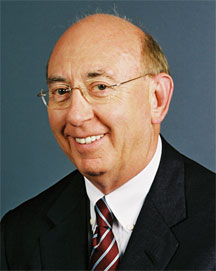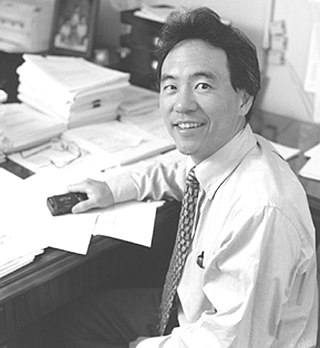Related Research Articles

The Baylor College of Medicine (BCM) is a private medical school in Houston, Texas, United States. Originally as the Baylor University College of Medicine from 1903 to 1969, the college became independent with the current name and has been separate from Baylor University since 1969. The college consists of four schools: the School of Medicine, the Graduate School of Biomedical Sciences, the School of Health Professions, and the National School of Tropical Medicine.

The University of Texas Southwestern Medical Center is a public academic health science center in Dallas, Texas. With approximately 23,000 employees, more than 3,000 full-time faculty, and nearly 4 million outpatient visits per year, UT Southwestern is the largest medical school in the University of Texas System and the State of Texas.

Vincent Theodore DeVita Jr. is the Amy and Joseph Perella Professor of Medicine at Yale Cancer Center, and a Professor of Epidemiology and Public Health. He directed the Yale Cancer Center from 1993 to 2003. He has been president of the board of directors of the American Cancer Society (2012-2013). He is internationally recognized as a pioneer in the field of oncology for his work on combination-chemotherapy treatments.

Texas Children's Hospital is an acute care women's and children's hospital located in Houston, Texas. With 973 beds, it is the primary pediatric teaching hospital affiliated with Baylor College of Medicine and is located within the Texas Medical Center.
Emil J. Freireich was an American hematologist, oncologist, and cancer biologist. He was recognized as a pioneer in the treatment of cancer and use of chemotherapy and is often known as the father of modern leukemia therapy.
Ralph David Feigin was an American pediatrician whose influential book Textbook of Pediatric Infectious Diseases was in its sixth printing at the time of his death.

John E. Niederhuber was the 13th director of the National Cancer Institute (NCI), from 2006 until July, 2010, succeeding Andrew von Eschenbach, who went on to become a director at biotechnology firm BioTime. A nationally renowned surgeon and researcher, Dr. Niederhuber has dedicated his four-decade career to the treatment and study of cancer - as a professor, cancer center director, National Cancer Advisory Board chair, external advisor to the NCI, grant reviewer, and laboratory investigator supported by NCI and the National Institutes of Health. He is now Executive Vice President/CEO Inova Translational Medicine Institute and Inova Health System and co-director, Johns Hopkins Clinical Research Network.

Larry Kwak is an American cancer researcher who works at City of Hope in Duarte, California and is the Director of the Toni Stephenson Lymphoma Center at City of Hope. Dr. Kwak formerly worked at the University of Texas MD Anderson Cancer Center. He was included on Time's list of 2010's most influential people.
Minesh Prafulchandra Mehta is an American radiation oncologist and physician-scientist of Indian origin and Ugandan birth. He is currently deputy director and chief of radiation oncology at Miami Cancer Institute at Baptist Health South Florida.
Frank Aram Oski was an American pediatrician. After holding several faculty positions at medical schools, he spent several years as the chair of pediatrics at Johns Hopkins School of Medicine. He was the founder and editor of the journal Contemporary Pediatrics, and he edited one of the most widely read textbooks in pediatrics.

Stephen Jacob Chanock is an American physician and geneticist. He currently serves as Director of the Division of Cancer Epidemiology and Genetics at the U.S. National Cancer Institute (NCI).
UCSF Helen Diller Family Comprehensive Cancer Center is an NCI-designated Cancer Center, affiliated with the UCSF School of Medicine and the UCSF Medical Center. It is one of 69 cancer research institutions in the United States supported by the National Cancer Institute, and one of three in Northern California. The HDFCCC integrates basic and clinical science, patient care, and population science to address prevention and early detection of cancer as well as the quality of life following diagnosis and treatment.
Oliver Sartor is an American oncologist and research scientist. He is currently the chair of the genitourinary cancer disease group and director of radiopharmaceutical clinical trials at Mayo Clinic Rochester. He was previously the assistant dean for oncology and the C.E. and Bernadine Laborde Professor of Cancer Research, Medicine and Urology Departments at the Tulane School of Medicine in New Orleans, Louisiana. His research has mainly focused on translational science and clinical research trials of advanced prostate cancer since 1990 and he is recognized as an expert in that field through his contributions to the practice and the publishing of over 500 peer-reviewed articles and numerous book chapters and reviews. Sartor also serves as the editor-in-chief of the bimonthly journal Clinical Genitourinary Cancer that mainly focuses on research in genitourinary oncology.

Philip A. Pizzo is an American professor, physician, and scientist. He is the David and Susan Heckerman Professor of Microbiology and Immunology, Emeritus at Stanford University, and founding director of Stanford's Distinguished Careers Institute. He served as the 11th Dean of the Stanford University School of Medicine from 2001 to 2012. He spent over two decades at the National Institutes of Health, and has devoted much of his medical career to the diagnosis, management, prevention and treatment of children with cancer and AIDS. He has also focused on the future of higher education, specifically for individuals in mid- to late-life. In 2022, he enrolled as a rabbinical student at the Academy for Jewish Religion, California.

Brigid Gray Leventhal was a British-American pediatric oncologist. She was the first director of the Pediatric Oncology Division at Johns Hopkins University, a position she held from 1976 to 1984. She was inducted into the Maryland Women's Hall of Fame in 1996.

David R. Gius is an American physician-scientist the Zell Family Scholar Professor, Women's Cancer Research Program director, and Vice Chair of Translational Research at Northwestern University's Feinberg School of Medicine Department of Radiation Oncology and Pharmacology. His research focuses into the mechanistic connection between aging, cellular and/or mitochondrial metabolism, and carcinogenesis focusing on the Sirtuin gene family.

Nancy Jane Tarbell is the C.C. Wang Professor of Radiation Oncology at Harvard Medical School and Massachusetts General Hospital. Previously, she was the Dean for Academic and Clinical Affairs at Harvard Medical School (2008–2019).
Jonathan Lester Finlay is a pediatric neuro-oncologist specializing in the management of children, adolescents and young adults with brain tumors. He is the director of Neuro-oncology at Nationwide Children's Hospital, where he also serves as the Elizabeth and Richard Germain Endowed Chair in Pediatric Cancer. He also is professor of pediatrics at The Ohio State University College of Medicine.
Martha A. Zeiger is an American endocrine surgeon and scientist. She is currently Director of the Center for Cancer Research Office of Surgeon-Scientist Career Development at the National Institutes of Health (NIH). She is also an adjunct investigator in the Surgical Oncology Program at NIH's National Cancer Institute, where she previously served as director. She was the S. Hurt Watts Professor and Chair of the Department of Surgery at the University of Virginia. Prior to joining academia, Zeiger spent six years in the United States Navy as General Medical Officer, Commander and Surgeon in San Diego, Hawaii and Washington, D.C.

Sharon A. Savage is an American pediatric hematologist/oncologist. She is the clinical director of the National Cancer Institute's Division of Cancer Epidemiology and Genetics.
References
- ↑ Ackerman, Todd (13 July 2018). "New leadership at Texas Children's Cancer Center". Houston Chronicle. Retrieved 1 April 2019.
- ↑ Poplack, David G.; Pizzo, Phillip A. (2015). Principles and Practice of Pediatric Oncology (7th ed.). Lippincott Williams & Wilkins. ISBN 9781451194234.
- ↑ BMA Medical Book Awards: Oncology — Highly Commended (2016). British Medical Association.